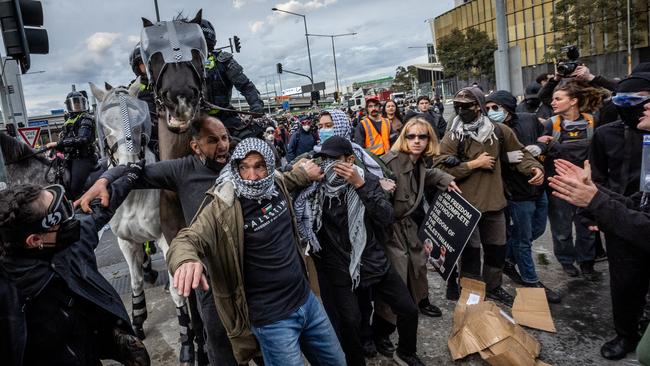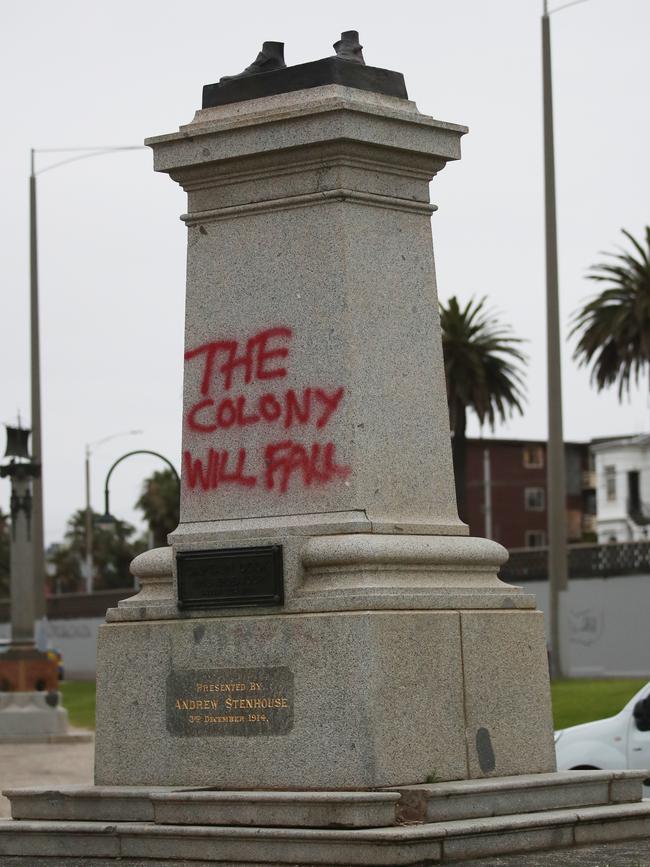The year of living in ugliness and despair
But this year the arcadian call of summer holidays and the blessed touch of Christmas are pitted against a kind of psychic contagion drifting across the whole society.

Children flock annually in their tens of thousands to marvel at the Melbourne Myer Christmas windows. Magic opens the festive season. This year, however, out of security fears, Myer cancelled its opening ceremony and, on the first day, children were harangued by pro-Palestine demonstrators wielding megaphones and lectured that if they looked at these windows they were stupid.
This attempt to assault the innocent pleasures of childhood is one symptom of where we are at.
It has been an ugly year – the habitat fouled, the odour sour. The time is one of degraded public spaces, smeared with grunge, grimed with graffiti, potholed roads, uncollected rubbish littering country roads, bronze statues of national heroes such as James Cook hacked down and stolen, police horses attacked with stones and acid, slovenly drongoid governments squandering their power, citizens ditching the ethos of tolerance and a fair go that has made the country one of the best places in the world to live. Then, pressing at the desolate limits of civic rupture, the firebombing of a synagogue.

Where have our communal pride and ethos gone?
Every year in this country, Christmas heralds a utopian period for most. Annual holidays from school and work begin. It is summer. The seaside beckons, with the eternal call of the sea, waves rolling into golden beaches, the clean azure and turquoise waters glistening, the tang of fresh salt air in the breeze. Yachts glide and bob on the horizon. Pleasant distractions include the lazy ease of summer sport, cricket at the leisurely pace of five-day Test matches, the thwack of ball on tennis racquet at the Australian Open. It is good to be alive.
But this year the arcadian call of summer holidays and the blessed touch of Christmas are pitted against a kind of psychic contagion drifting across the whole society.
Let me illustrate by considering what happens when a stranger comes through the door of a room. The presence of the other can inspire, excite or charm; calm or unsettle; or distress, deplete and depress. Psychic contagion is arguably the least understood factor in personal and social relations, and the most underestimated.
Now something analogous to this may operate on a much larger scale, a vast and amorphous one, source unknown, spreading right across the public sphere, overcasting it with an indefinable darker mood, a tinge of ethereal gloomy not-rightness, infectious in its slow, debilitating consequences.
The ancient Greeks imagined this kind of obscure force as a miasma, a kind of dark mist or oppressive supernatural vapour settling over humans and their doings, discombobulating them, making them behave badly and do stupid things.
Let me chart current ugliness as I see it. There are four main areas.
Social cohesion
First, social cohesion. The key to our multicultural success since 1945 is, for the first time, under perilous threat. No group of 20th-century immigrants to this country has made a greater contribution to the nation’s wellbeing than the Jews, yet today they have been driven to post armed guards at their schools.
Typical of the new menacing intolerance, Jewish singer-songwriter and author Deborah Conway has had her theatre shows routinely targeted by screaming protesters, bookshop talks vandalised, and she found her invitations to numerous writers festival withdrawn, one by one, including twice by the Byron Bay Writers Festival, which boasts about its relaxed atmosphere and inclusiveness. Covert anti-Semitism simmers away among well-educated professionals who question Israel’s legitimacy. Imams are allowed to preach genocidal hatred echoing Nazi doctrine in public mosques.
All the while, governments and police have timidly looked away or made token gestures, in effect colluding in social division. The 90 per cent of Australians who disapprove of Free Palestine demonstrations are left perplexed in their now leaderless country.
Social cohesion is also under stress because of housing. The Australian dream has been predicated on young couples owning their own homes, the bedrock of happy family life and social stability. Today, Generation Z is recording declining levels of optimism about the future, with a major component its well-justified perception that it has been excluded from the housing market.
Perhaps little wonder, then, that it displaces its frustration into political demonstrations about international issues it little comprehends.

Incompetent government
The second area of ugliness is the pall cast by incompetent government. We do not live a well-run country any more, and most of the states are little better off. Good government depends on judgment, setting up a hierarchy from what is trivial up to what is essential, followed by confidence in judging priorities, so that there is enough will to drive the usually long and hard slog it takes to implement policy.

Basic needs are not being met, led by affordable gas and electricity. Households are punished by interest rates significantly higher than in equivalent developed countries. In a newly threatening geopolitical climate, defence is not taken seriously and, worse, the incoming government of our benevolent alliance protector, the US, must be shaking its head at our Foreign Minister’s ongoing propensity to insult Israel, and its retention of an ambassador given to inflammatory denigration of the president-elect.
Linked, there is the cost of living. Australia has just experienced the most drastic, confidence-shaking drop in living standards since the recession of the late 1950s – 10 per cent across three years. It is little wonder governments around the Western world, and of all colours, are being thrown out – they are not looking after their people. The Trump victory was carried by a revolt right across middle America and, irrespective of gender, ethnicity and location, against government that it saw as lost in faddish causes instead of attending to basic needs.
In Australia, country residents report not visiting relatives because they can’t afford the petrol. Pensioners are not buying medicine because they must eat. Families are being forced on to junk fast food because it’s cheaper. Meanwhile, the federal government coos with heady enthusiasm about bubble ideals, notably meeting laughably unrealistic carbon emission targets and conjuring up reliable energy out of renewables, while it mismanages a stagnant economy.
Injustice against women
My third example of ugliness has nothing to do with government. It is the continuing injustice suffered by women in virtually all societies and times, and still in our own today.
For all the success since 1945 of equal opportunity, and women moving into senior positions across most of the work spectrum, on one key front the modern female quest has hit a roadblock. Yes, in the case of employment, greater numbers of women have continued to move steadily into senior roles in corporations, professions, politics, administration and the media. The face of public life has slowly changed in the direction of gender equality.
Yet crimes against women, notably sexual assault and harassment, if anything have continued to increase, even factoring in the unreliability of statistics in this area. In Britain, in the five years from 2018, police records show a 40 per cent increase in violence against women and girls. The hidden underbelly is domestic violence. Although the intimate-partner homicide rate, which is the tip of the iceberg and the measurable part, dropped by two-thirds in the 30 years from 1990 in Australia, still one murder a week has been occurring.
Damningly, a cursory look at the cases of serious crime to come before the law courts would readily support the conclusion that a male war against women continues to be waged right across Australia. Workplaces remain in which hyper-masculine harassment of women is the norm, such as parts of the military, police, construction, firefighting, media and some sports coaching.
And in other workplaces across almost the entire employment spectrum, harassment is common, if not the norm – workplaces from parliaments to hospitals to corporate offices. Schools report increasing rates of teenage boys using misogynistic language towards female teachers and students, and even ganging up to intimidate women.
Where there is crime there should be law. Yet, despite the best intentions of legislators, the law has proved a largely ineffectual check. The compounding reality, which barely changes, is that a low percentage of sexual assault cases are reported to the police; a small fraction of those result in criminal prosecution; and, within the courts themselves, a relatively low percentage of trials result in guilty verdicts, compared with other areas of the criminal law.
There also remains an in-built bias in the courts that favours men accused of sexual predation – as for example, in excluding as inadmissible, tendency evidence of the accused having a proven past record of, say, rape. And it takes only two prejudiced male jurors in rape trials to bring in a verdict of not guilty.
Education
My fourth category of things out of joint is education. Secondary school teaching has always been formidably challenging, but it is now beset by deepening problems. It takes vocational dedication of the highest order to take on school behaviour management today, especially of testosterone-addled, mid-adolescent boys who have no interest in learning, don’t want to be there, have little self-control and no respect for teachers, especially female ones. Teachers can no longer expect strong support from principals, who have had much of their institutional authority stripped away.
And there is now the added constant distraction of social media, and the discomposure in the classroom of surreptitious video gaming and malicious texting. Is it not one sign of a failing society that a third of its secondary teachers consider quitting?
The broader cultural climate shaping education is projected out from the universities. But universities today have little idea of their mission, and accordingly little will to impose standards in curriculum or assessment. It is most apparent in the humanities and arts that administrations have lost any sense of what they should be doing, the tradition they inherit, their obligation to pass on the best works of the culture, and its methods of thinking and writing.
So, across the past two decades the traditional mode of teaching by means of lectures and seminars has been wound down, online classes encouraged, and as a result, with attendance optional, the average campus has become a ghost town with its vibrancy gone.
The camaraderie of student life, a relic from a recent past, is replaced with students sitting at home alone in pyjamas, half-heartedly following classes on a laptop.
The latest turn in this road of demoralisation, for academic staff and students alike, has come with artificial intelligence. Some universities are advising students to use AI in writing assignments. They thereby encourage cheating. Lecturers are asked to participate in this charade, of marking phony essays and pretending the student has qualified in mastering their subject – indeed, why not have AI mark AI essays?
University humanities used to be able to advertise that students graduated with a broad education and skills in analysis, critical thinking and fluent writing well suited for a flexible employment environment. The new bachelor of arts or social sciences will credit little more than the rudimentary ability to use ChatGPT, with the university perpetrating fraud, as it acts complicitly in de-skilling. The AI challenge could be addressed quite simply by reintroducing formal exams, written with pen and paper, but that would take some self-belief and some nerve.
Christmas holidays should provide respite from the cares of everyday life. Those cares need to be ephemeral enough to cast aside for a few weeks.
I fear the ugliness I have been charting is more deeply embedded, with long-term consequences casting a thick and pervasive pall, a miasma. While such a smog of discontent, a malaise throwing the whole nation off balance, is impossible to calibrate, it is worth recalling that the weak period in Australian economic history lasted for a long half-century, from 1890 to 1940, a period of protracted economic stagnation, although combined with negligible social unrest. Bad times are not necessarily short.
For parents, a deep existential need overrides everything else. The most important and gratifying work most will ever do is bringing up their children and preparing them for adulthood.
Accordingly, they take education with ultimate seriousness, many willing to straitjacket their lifestyles to afford high school fees. It will then be the task of those children to renew the world they inherit.
Parents need support in this, their vital life endeavour. Obviously, they need support from extended families, schools and teachers. But also, and arguably most important, they need a wider frame of encouragement for their own capacity to infuse a sense of enchantment into the business of living. Growing up with an exuberance for life, a will to take it on, an excitement, will depend on having experienced a childhood bathed in the potential magic of the world. Hence the appeal of Christmas, with parents having a right instinct to celebrate it.
When carols such as Silent Night no longer cast their opening charm across summer holidays, there is risk everyday discontents will prevail.
John Carroll is professor emeritus of sociology at La Trobe University.





To join the conversation, please log in. Don't have an account? Register
Join the conversation, you are commenting as Logout